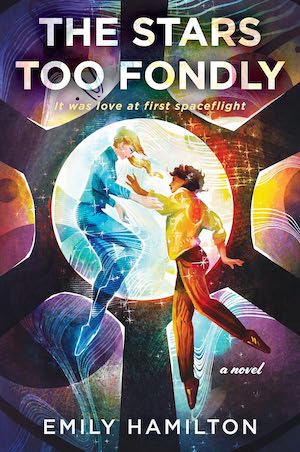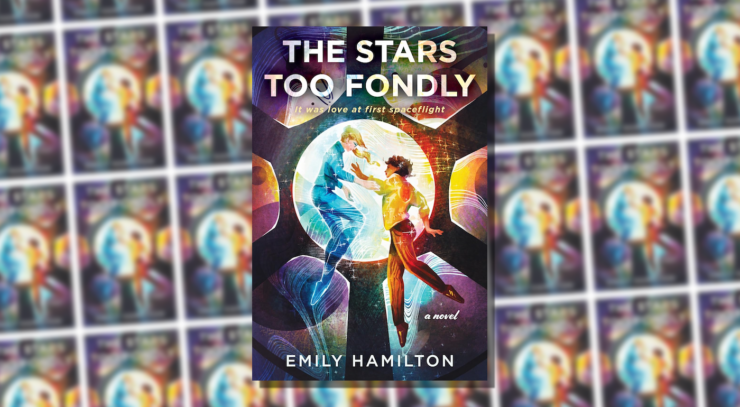The Stars Too Fondly is Emily Hamilton’s debut novel. It’s a fast-paced, entertaining science-fiction romance romp, replete with pop-culture riffs and references. But underneath the smart-arse asides, witty banter, and sexual-romantic chemistry, I’m not sure it has any real core of meaning beyond the platitudinous.
Not everything has to be deep and meaningful, of course, but it’s good to set your expectations appropriately.
Cleo McQueary and her well-educated mid-twenties friends Kaleisha Reid, Abraham Yang (of whom the first thing we learn is that, “He was Chinese American”), and Ros Wheeler, didn’t intend to steal the Providence I spacecraft. They only wanted to break in and see for themselves the vessel that, twenty years prior in 2041, had been humanity’s best hope for establishing a human population on another world and perpetuating the species beyond Earth’s seemingly-inevitable rapid decline.1 At least it was, before the Providence’s entire crew simply vanished from aboard her in the middle of the launch sequence. Cleo and her friends hope to find out why—a question that the very thorough investigation of twenty years before could not answer.
But the dark matter engine—the proprietary, experimental technology that was supposed to allow the Providence to travel to Proxima Centauri B,2 and a technology that has since been abandoned, along with a crewed space program—starts all on its own as soon as Cleo and her friends get close to the engine. The Providence takes them automatically and unstoppably through launch, into space, and well on their irreversible way to Proxima Centauri—a seven-year voyage. Their only assistance is the holographic artificial intelligence built from the mind and memories of the ship’s captain, Wilhelmina Lucas, or Billie to her friends.
Apart from being holographic, Billie is otherwise indistinguishable from the original Captain Lucas, and she’s not thrilled that her entire crew, including her little brother Elijah, are vanished-presumed-dead. Meanwhile, except for Cleo, the friends are coping pretty badly with the idea that they’re going to spend fourteen years trapped aboard the Providence with only each other for company before they could possibly return home, and even Cleo’s not exactly coping brilliantly well. Matters only become more complicated when it transpires that their brief brush up close and personal with the dark matter engine has given them strange abilities, abilities which in Cleo’s case appear to let her see into parts of the past.
Buy the Book


The Stars Too Fondly
They need to be able to control their abilities, for their safety and the safety of the ship, and while learning to do so, Cleo a) starts to get hints about how and why the entire crew vanished, and b) starts falling in love with the literally untouchable Billie, who also reciprocates her feelings, even though she no longer has a body. An awkward state of affairs, to be sure.
Between Billie’s memories and Cleo’s new powers, the friends slowly begin to figure out what actually happened with the Providence all those years ago. It involves interaction with another dimension—the “Other Place,” as Hamilton’s characters call it.
The crew of the Providence are not dead, after all, but rather they—including Captain Lucas—were translated to this Other Place, where they have been kept ever since, unharmed but unchanging. We learn this in Captain Lucas’s point of view, in interludes interspersed with the rest of the narrative, and we learn, too, that Captain Lucas can see into her original dimension. She’s been falling in love with Cleo even as Cleo and Billie have been falling in love with each other.
Captain Lucas wants the Other Place to let her and her crew go, and she wants Cleo and her friends to use their abilities to a) stop a terrible threat to the Other Place, and b) let the crew out, if the Other Place won’t release them on its own. Love, as they say, is the most powerful force in the universe, and this is a love story, so you know it will all come right in the end.
I had thought that Hamilton would do something clever and plausible within the constraints of the universe she developed, and have the AI Billie turn out not to be AI at all, but rather a projection of Captain Lucas from the Other Place. The novel sets itself in 2061; it seems deeply implausible that someone could copy their entire consciousness into digital form, a true artificial person indistinguishable from the original, in 2041. A projection of a real person would make the romantic happy ending—in which AI-Billie sacrifices herself to save the four friends, but also in which Cleo ends up with the real Billie, who’s aware of everything that happened with AI-Billie, so the happily-ever-after remains in prospect—seem less pat and unearned. But this is not the case: AI-Billie is a true AI, after all. In the face of that required suspension of disbelief, the fact that all the equipment aboard the Providence is still in situ and working reasonably well, rather than removed during the course of the investigation, or sold off and repurposed in course of the two decades since, and that the crew’s next of kin has not claimed their effects, is a much smaller hurdle to clear.
Perhaps I’m too demanding in wanting the set dressing for this story of friendship, superpowers, space and romance to make sense within its own context. Hamilton writes with verve and style, and makes it easy to overlook the novel’s flaws. The Stars Too Fondly reminds me of the fluffier end of Star Trek, and in its tone, of Becky Chambers’ The Long Way to a Small Angry Planet. Its explicitly diverse cast, with its trans and nonbinary characters and their care for and connection to each other, is pleasant to read, and its narrative trips entertainingly along. I’m too jaded to be its ideal reader, but I expect plenty of others will find it heart-warming and delightful.
The Stars Too Fondly is published by Harper Voyager.
- I don’t know about you, but in my case, the more I learn about space, the more my attitude towards Earth—even an Earth suffering under the hellish consequences of 6 degrees Celsius or more of global warming—is you will pry me off this Edenic paradise world when the sun cooks it and not before, since it seems that even the best case scenario for inhabiting other worlds would involve living in tunnels like moles with extremely restricted resources. Let’s try that here, first. ↩︎
- Hamilton’s Proxima Centauri B is tidally locked, with a narrow band of barely-survivable temperatures in its twilight zone, but possesses a human-breathable atmosphere and was, apparently, reachable by probes that returned prior to 2041. ↩︎










